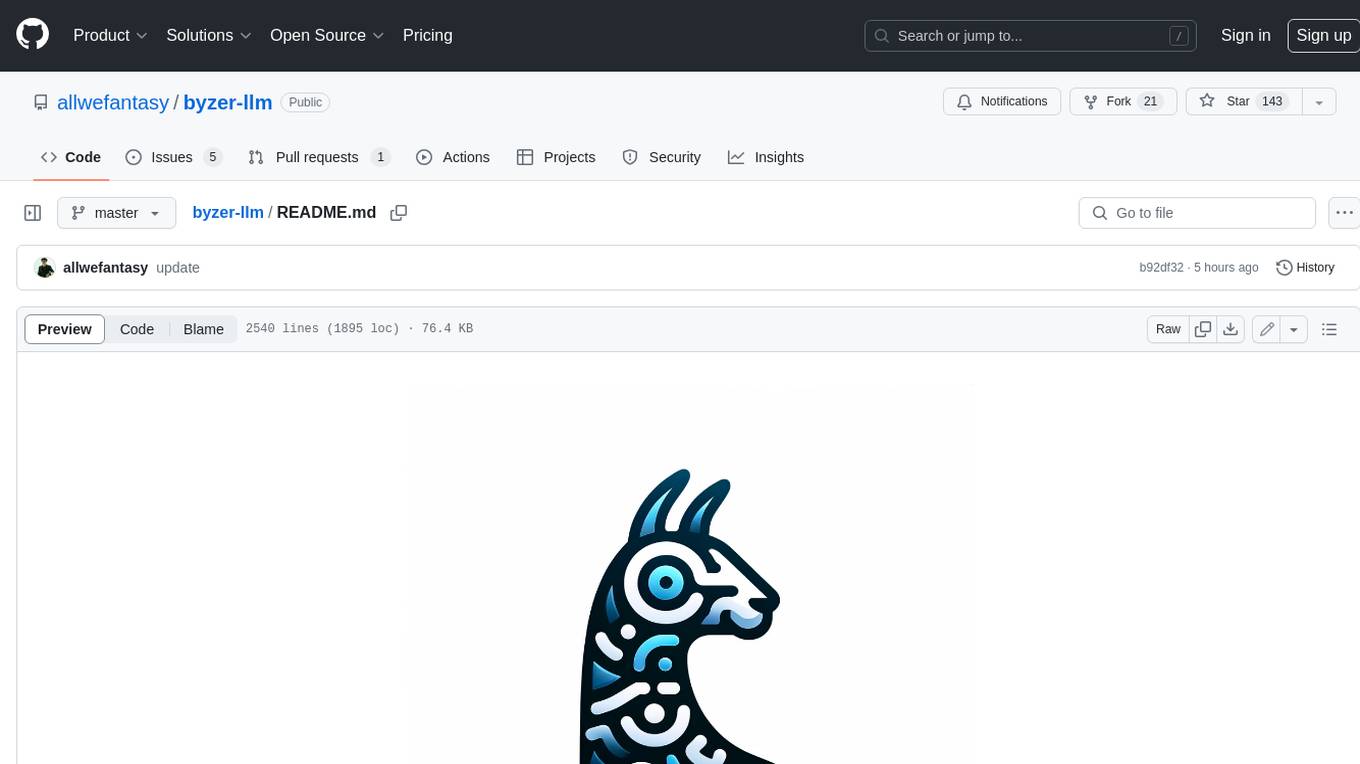
hezar
The all-in-one AI library for Persian, supporting a wide variety of tasks and modalities!
Stars: 872
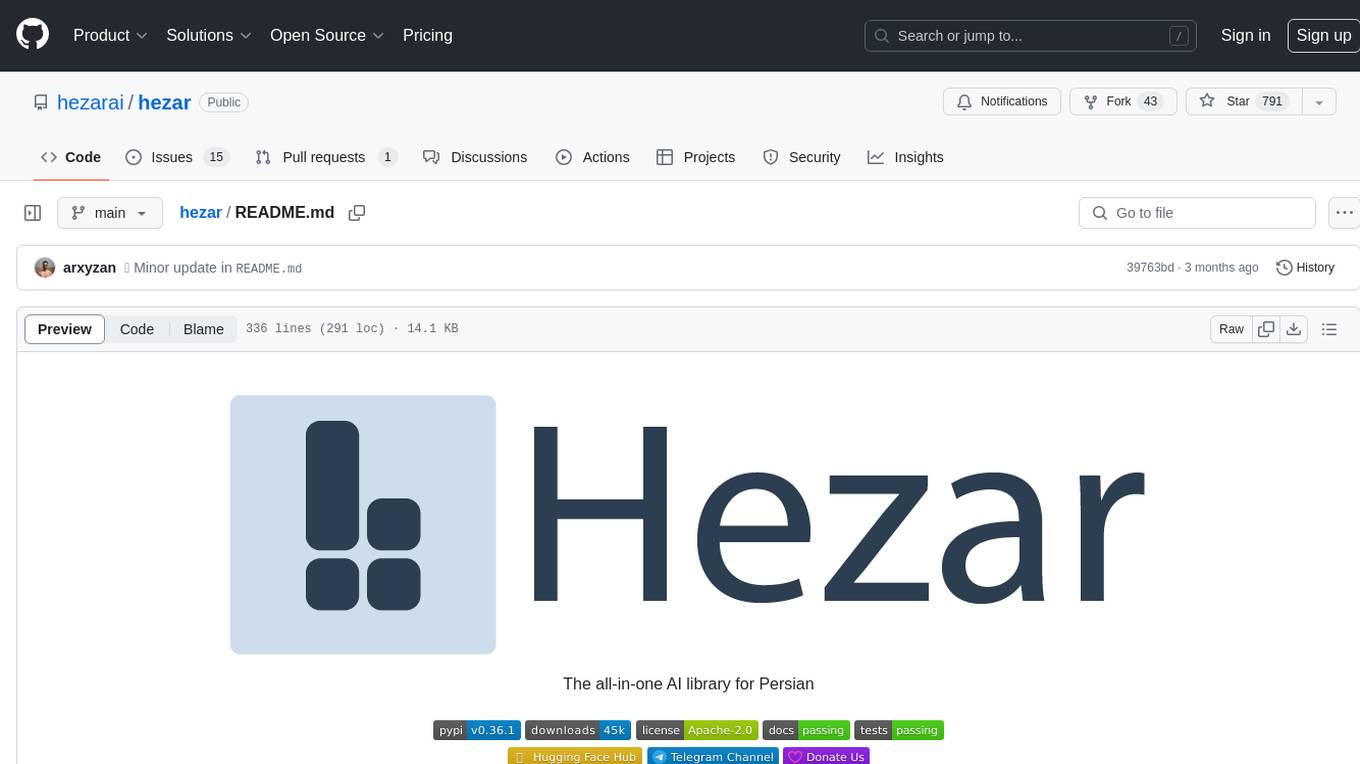
Hezar is an all-in-one AI library designed specifically for the Persian community. It brings together various AI models and tools, making it easy to use AI with just a few lines of code. The library seamlessly integrates with Hugging Face Hub, offering a developer-friendly interface and task-based model interface. In addition to models, Hezar provides tools like word embeddings, tokenizers, feature extractors, and more. It also includes supplementary ML tools for deployment, benchmarking, and optimization.
README:
Hezar (meaning thousand in Persian) is a multipurpose AI library built to make AI easy for the Persian community!
Hezar is a library that:
- brings together all the best works in AI for Persian
- makes using AI models as easy as a couple of lines of code
- seamlessly integrates with Hugging Face Hub for all of its models
- has a highly developer-friendly interface
- has a task-based model interface which is more convenient for general users.
- is packed with additional tools like word embeddings, tokenizers, feature extractors, etc.
- comes with a lot of supplementary ML tools for deployment, benchmarking, optimization, etc.
- and more!
Hezar is available on PyPI and can be installed with pip (Python 3.10 and later):
pip install hezar
Note that Hezar is a collection of models and tools, hence having different installation variants:
pip install hezar[all] # For a full installation
pip install hezar[nlp] # For NLP
pip install hezar[vision] # For computer vision models
pip install hezar[audio] # For audio and speech
pip install hezar[embeddings] # For word embedding models
You can also install the latest version from the source:
git clone https://github.com/hezarai/hezar.git
pip install ./hezar
Explore Hezar to learn more on the docs page or explore the key concepts:
There's a bunch of ready to use trained models for different tasks on the Hub!
🤗Hugging Face Hub Page: https://huggingface.co/hezarai
Let's walk you through some examples!
- Text Classification (sentiment analysis, categorization, etc)
from hezar.models import Model
example = ["هزار، کتابخانهای کامل برای به کارگیری آسان هوش مصنوعی"]
model = Model.load("hezarai/bert-fa-sentiment-dksf")
outputs = model.predict(example)
print(outputs)[[{'label': 'positive', 'score': 0.812910258769989}]]
- Sequence Labeling (POS, NER, etc.)
from hezar.models import Model
pos_model = Model.load("hezarai/bert-fa-pos-lscp-500k") # Part-of-speech
ner_model = Model.load("hezarai/bert-fa-ner-arman") # Named entity recognition
inputs = ["شرکت هوش مصنوعی هزار"]
pos_outputs = pos_model.predict(inputs)
ner_outputs = ner_model.predict(inputs)
print(f"POS: {pos_outputs}")
print(f"NER: {ner_outputs}")POS: [[{'token': 'شرکت', 'label': 'Ne'}, {'token': 'هوش', 'label': 'Ne'}, {'token': 'مصنوعی', 'label': 'AJe'}, {'token': 'هزار', 'label': 'NUM'}]]
NER: [[{'token': 'شرکت', 'label': 'B-org'}, {'token': 'هوش', 'label': 'I-org'}, {'token': 'مصنوعی', 'label': 'I-org'}, {'token': 'هزار', 'label': 'I-org'}]]
- Mask Filling
from hezar.models import Model
model = Model.load("hezarai/roberta-fa-mask-filling")
inputs = ["سلام بچه ها حالتون <mask>"]
outputs = model.predict(inputs, top_k=1)
print(outputs)[[{'token': 'چطوره', 'sequence': 'سلام بچه ها حالتون چطوره', 'token_id': 34505, 'score': 0.2230483442544937}]]
- Speech Recognition
from hezar.models import Model
model = Model.load("hezarai/whisper-small-fa")
transcripts = model.predict("examples/assets/speech_example.mp3")
print(transcripts)[{'text': 'و این تنها محدود به محیط کار نیست'}]
- Text Detection (Pre-OCR)
from hezar.models import Model
from hezar.utils import load_image, draw_boxes, show_image
model = Model.load("hezarai/CRAFT")
image = load_image("../assets/text_detection_example.png")
outputs = model.predict(image)
result_image = draw_boxes(image, outputs[0]["boxes"])
show_image(result_image, "result")- Image to Text (OCR)
from hezar.models import Model
# OCR with CRNN
model = Model.load("hezarai/crnn-fa-printed-96-long")
texts = model.predict("examples/assets/ocr_example.jpg")
print(f"CRNN Output: {texts}")CRNN Output: [{'text': 'چه میشه کرد، باید صبر کنیم'}]
- Image to Text (License Plate Recognition)
from hezar.models import Model
model = Model.load("hezarai/crnn-fa-license-plate-recognition")
plate_text = model.predict("assets/license_plate_ocr_example.jpg")
print(plate_text) # Persian text of mixed numbers and characters might not show correctly in the console[{'text': '۵۷س۷۷۹۷۷'}]
- Image to Text (Image Captioning)
from hezar.models import Model
model = Model.load("hezarai/vit-roberta-fa-image-captioning-flickr30k")
texts = model.predict("examples/assets/image_captioning_example.jpg")
print(texts)[{'text': 'سگی با توپ تنیس در دهانش می دود.'}]
We constantly keep working on adding and training new models and this section will hopefully be expanding over time ;)
- FastText
from hezar.embeddings import Embedding
fasttext = Embedding.load("hezarai/fasttext-fa-300")
most_similar = fasttext.most_similar("هزار")
print(most_similar)[{'score': 0.7579, 'word': 'میلیون'},
{'score': 0.6943, 'word': '21هزار'},
{'score': 0.6861, 'word': 'میلیارد'},
{'score': 0.6825, 'word': '26هزار'},
{'score': 0.6803, 'word': '٣هزار'}]
- Word2Vec (Skip-gram)
from hezar.embeddings import Embedding
word2vec = Embedding.load("hezarai/word2vec-skipgram-fa-wikipedia")
most_similar = word2vec.most_similar("هزار")
print(most_similar)[{'score': 0.7885, 'word': 'چهارهزار'},
{'score': 0.7788, 'word': '۱۰هزار'},
{'score': 0.7727, 'word': 'دویست'},
{'score': 0.7679, 'word': 'میلیون'},
{'score': 0.7602, 'word': 'پانصد'}]
- Word2Vec (CBOW)
from hezar.embeddings import Embedding
word2vec = Embedding.load("hezarai/word2vec-cbow-fa-wikipedia")
most_similar = word2vec.most_similar("هزار")
print(most_similar)[{'score': 0.7407, 'word': 'دویست'},
{'score': 0.7400, 'word': 'میلیون'},
{'score': 0.7326, 'word': 'صد'},
{'score': 0.7276, 'word': 'پانصد'},
{'score': 0.7011, 'word': 'سیصد'}]
For a full guide on the embeddings module, see the embeddings tutorial.
You can load any of the datasets on the Hub like below:
from hezar.data import Dataset
# The `preprocessor` depends on what you want to do exactly later on. Below are just examples.
sentiment_dataset = Dataset.load("hezarai/sentiment-dksf", preprocessor="hezarai/bert-base-fa") # A TextClassificationDataset instance
lscp_dataset = Dataset.load("hezarai/lscp-pos-500k", preprocessor="hezarai/bert-base-fa") # A SequenceLabelingDataset instance
xlsum_dataset = Dataset.load("hezarai/xlsum-fa", preprocessor="hezarai/t5-base-fa") # A TextSummarizationDataset instance
alpr_ocr_dataset = Dataset.load("hezarai/persian-license-plate-v1", preprocessor="hezarai/crnn-fa-printed-96-long") # An OCRDataset instance
flickr30k_dataset = Dataset.load("hezarai/flickr30k-fa", preprocessor="hezarai/vit-roberta-fa-base") # An ImageCaptioningDataset instance
commonvoice_dataset = Dataset.load("hezarai/common-voice-13-fa", preprocessor="hezarai/whisper-small-fa") # A SpeechRecognitionDataset instance
...The returned dataset objects from load() are PyTorch Dataset wrappers for specific tasks and can be used by a data loader out-of-the-box!
You can also load Hezar's datasets using 🤗Datasets:
from datasets import load_dataset
dataset = load_dataset("hezarai/sentiment-dksf")For a full guide on Hezar's datasets, see the datasets tutorial.
Hezar makes it super easy to train models using out-of-the-box models and datasets provided in the library.
from hezar.models import BertSequenceLabeling, BertSequenceLabelingConfig
from hezar.data import Dataset
from hezar.trainer import Trainer, TrainerConfig
from hezar.preprocessors import Preprocessor
base_model_path = "hezarai/bert-base-fa"
dataset_path = "hezarai/lscp-pos-500k"
train_dataset = Dataset.load(dataset_path, split="train", tokenizer_path=base_model_path)
eval_dataset = Dataset.load(dataset_path, split="test", tokenizer_path=base_model_path)
model = BertSequenceLabeling(BertSequenceLabelingConfig(id2label=train_dataset.config.id2label))
preprocessor = Preprocessor.load(base_model_path)
train_config = TrainerConfig(
output_dir="bert-fa-pos-lscp-500k",
task="sequence_labeling",
device="cuda",
init_weights_from=base_model_path,
batch_size=8,
num_epochs=5,
metrics=["seqeval"],
)
trainer = Trainer(
config=train_config,
model=model,
train_dataset=train_dataset,
eval_dataset=eval_dataset,
data_collator=train_dataset.data_collator,
preprocessor=preprocessor,
)
trainer.train()
trainer.push_to_hub("bert-fa-pos-lscp-500k") # push model, config, preprocessor, trainer files and configsYou can actually go way deeper with the Trainer. See more details here.
Hezar hosts everything on the HuggingFace Hub. When you use the .load() method for a model, dataset, etc., it's
downloaded and saved in the cache (at ~/.cache/hezar) so next time you try to load the same asset, it uses the cached version
which works even when offline. But if you want to export assets more explicitly, you can use the .save() method to save
anything anywhere you want on a local path.
from hezar.models import Model
# Load the online model
model = Model.load("hezarai/bert-fa-ner-arman")
# Save the model locally
save_path = "./weights/bert-fa-ner-arman"
model.save(save_path) # The weights, config, preprocessors, etc. are saved at `./weights/bert-fa-ner-arman`
# Now you can load the saved model
local_model = Model.load(save_path)Moreover, any class that has .load() and .save() can be treated the same way.
Hezar's primary focus is on providing ready to use models (implementations & pretrained weights) for different casual tasks not by reinventing the wheel, but by being built on top of PyTorch, 🤗Transformers, 🤗Tokenizers, 🤗Datasets, Scikit-learn, Gensim, etc. Besides, it's deeply integrated with the 🤗Hugging Face Hub and almost any module e.g, models, datasets, preprocessors, trainers, etc. can be uploaded to or downloaded from the Hub!
More specifically, here's a simple summary of the core modules in Hezar:
-
Models: Every model is a
hezar.models.Modelinstance which is in fact, a PyTorchnn.Modulewrapper with extra features for saving, loading, exporting, etc. -
Datasets: Every dataset is a
hezar.data.Datasetinstance which is a PyTorch Dataset implemented specifically for each task that can load the data files from the Hugging Face Hub. - Preprocessors: All preprocessors are preferably backed by a robust library like Tokenizers, pillow, etc.
- Embeddings: All embeddings are developed on top of Gensim and can be easily loaded from the Hub and used in just 2 lines of code!
- Trainer: Trainer is the base class for training almost any model in Hezar or even your own custom models backed by Hezar. The Trainer comes with a lot of features and is also exportable to the Hub!
- Metrics: Metrics are also another configurable and portable modules backed by Scikit-learn, seqeval, etc. and can be easily used in the trainers!
For more info, check the tutorials
Maintaining Hezar is no cakewalk with just a few of us on board. The concept might not be groundbreaking, but putting it into action was a real challenge and that's why Hezar stands as the biggest Persian open source project of its kind!
Any contribution, big or small, would mean a lot to us. So, if you're interested, let's team up and make Hezar even better together! ❤️
Don't forget to check out our contribution guidelines in CONTRIBUTING.md before diving in. Your support is much appreciated!
We highly recommend to submit any issues or questions in the issues or discussions section but in case you need direct contact, here it is:
- [email protected]
- Telegram: @arxyzan
If you found this project useful in your work or research please cite it by using this BibTeX entry:
@misc{hezar2023,
title = {Hezar: The all-in-one AI library for Persian},
author = {Aryan Shekarlaban & Pooya Mohammadi Kazaj},
publisher = {GitHub},
howpublished = {\url{https://github.com/hezarai/hezar}},
year = {2023}
}For Tasks:
Click tags to check more tools for each tasksFor Jobs:
Alternative AI tools for hezar
Similar Open Source Tools

hezar
Hezar is an all-in-one AI library designed specifically for the Persian community. It brings together various AI models and tools, making it easy to use AI with just a few lines of code. The library seamlessly integrates with Hugging Face Hub, offering a developer-friendly interface and task-based model interface. In addition to models, Hezar provides tools like word embeddings, tokenizers, feature extractors, and more. It also includes supplementary ML tools for deployment, benchmarking, and optimization.
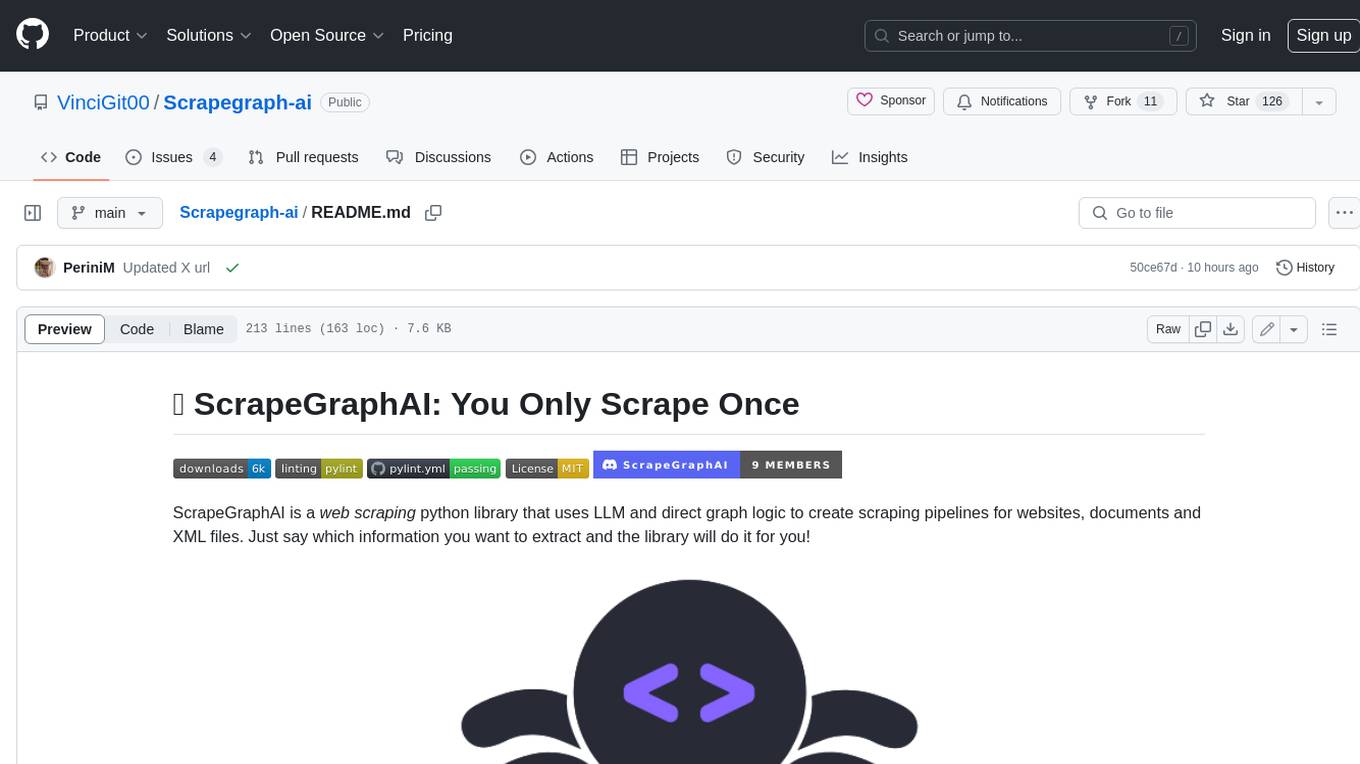
Scrapegraph-ai
ScrapeGraphAI is a Python library that uses Large Language Models (LLMs) and direct graph logic to create web scraping pipelines for websites, documents, and XML files. It allows users to extract specific information from web pages by providing a prompt describing the desired data. ScrapeGraphAI supports various LLMs, including Ollama, OpenAI, Gemini, and Docker, enabling users to choose the most suitable model for their needs. The library provides a user-friendly interface through its `SmartScraper` class, which simplifies the process of building and executing scraping pipelines. ScrapeGraphAI is open-source and available on GitHub, with extensive documentation and examples to guide users. It is particularly useful for researchers and data scientists who need to extract structured data from web pages for analysis and exploration.
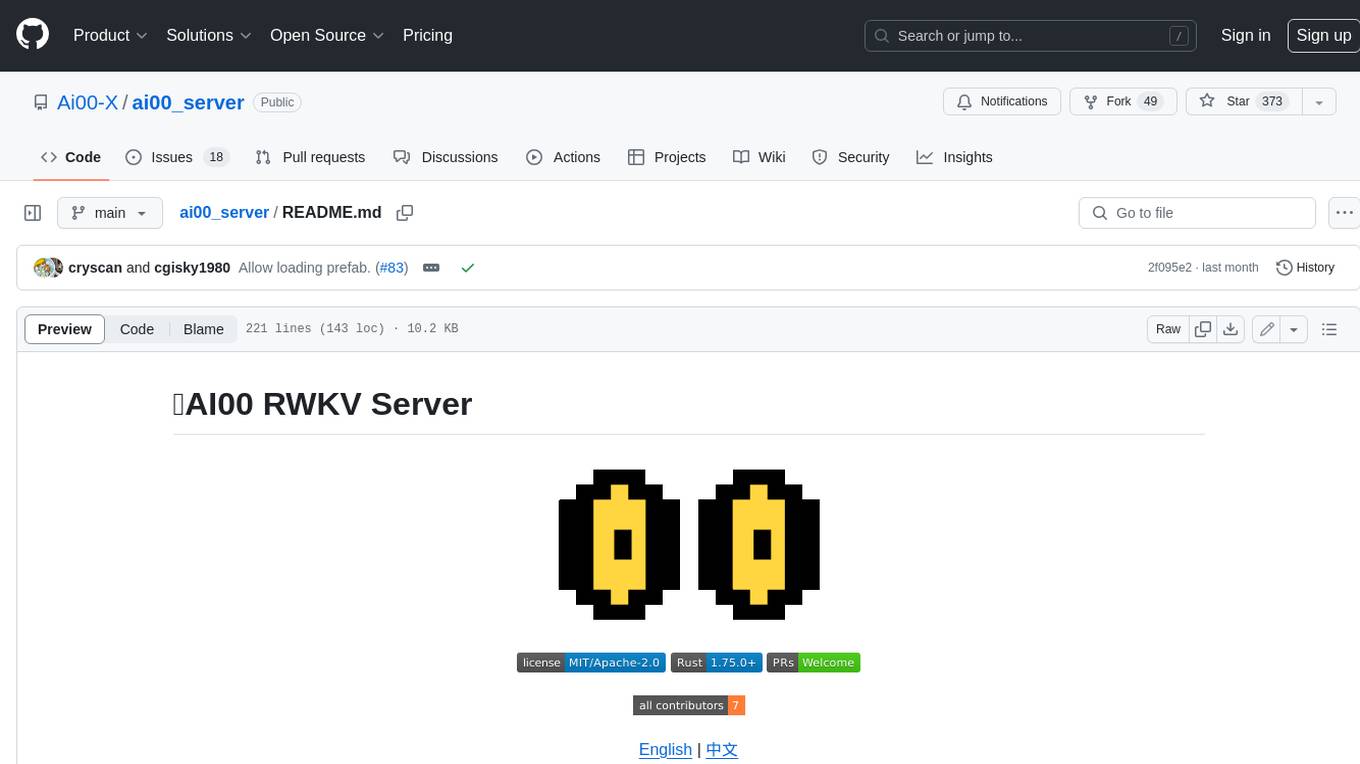
ai00_server
AI00 RWKV Server is an inference API server for the RWKV language model based upon the web-rwkv inference engine. It supports VULKAN parallel and concurrent batched inference and can run on all GPUs that support VULKAN. No need for Nvidia cards!!! AMD cards and even integrated graphics can be accelerated!!! No need for bulky pytorch, CUDA and other runtime environments, it's compact and ready to use out of the box! Compatible with OpenAI's ChatGPT API interface. 100% open source and commercially usable, under the MIT license. If you are looking for a fast, efficient, and easy-to-use LLM API server, then AI00 RWKV Server is your best choice. It can be used for various tasks, including chatbots, text generation, translation, and Q&A.
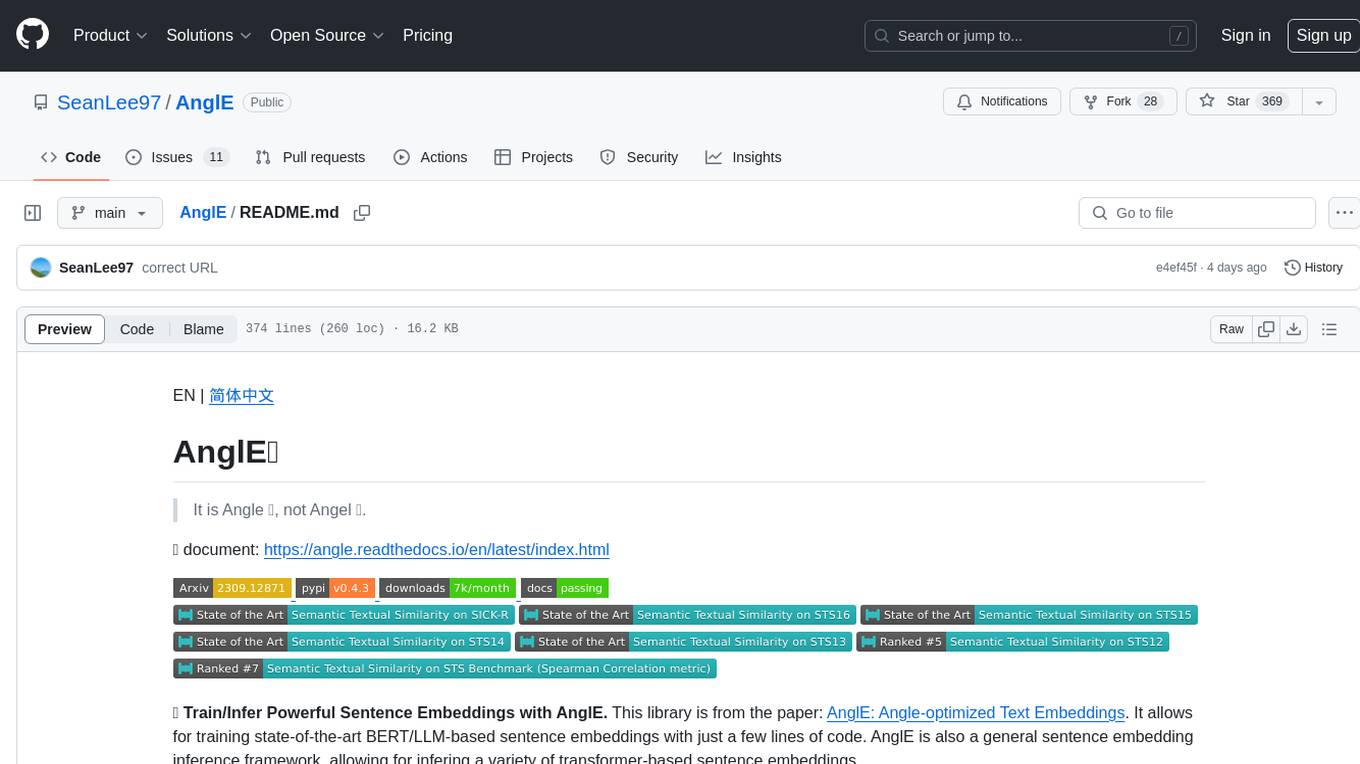
AnglE
AnglE is a library for training state-of-the-art BERT/LLM-based sentence embeddings with just a few lines of code. It also serves as a general sentence embedding inference framework, allowing for inferring a variety of transformer-based sentence embeddings. The library supports various loss functions such as AnglE loss, Contrastive loss, CoSENT loss, and Espresso loss. It provides backbones like BERT-based models, LLM-based models, and Bi-directional LLM-based models for training on single or multi-GPU setups. AnglE has achieved significant performance on various benchmarks and offers official pretrained models for both BERT-based and LLM-based models.
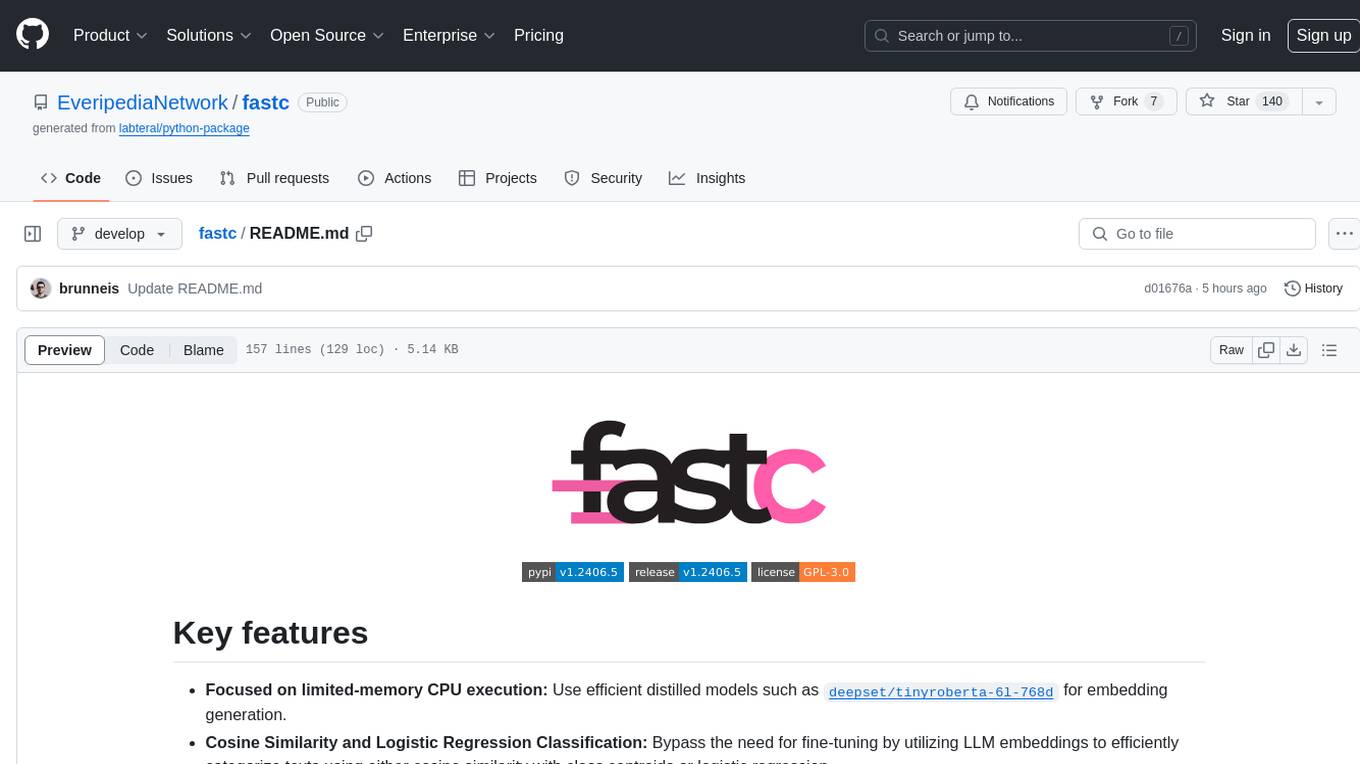
fastc
Fastc is a tool focused on CPU execution, using efficient models for embedding generation and cosine similarity classification. It allows for efficient multi-classifier execution without extra overhead. Users can easily train text classifiers, export models, publish to HuggingFace, load existing models, make class predictions, use instruct templates, and launch an inference server. The tool provides an HTTP API for text classification with JSON payloads and supports multiple languages for language identification.
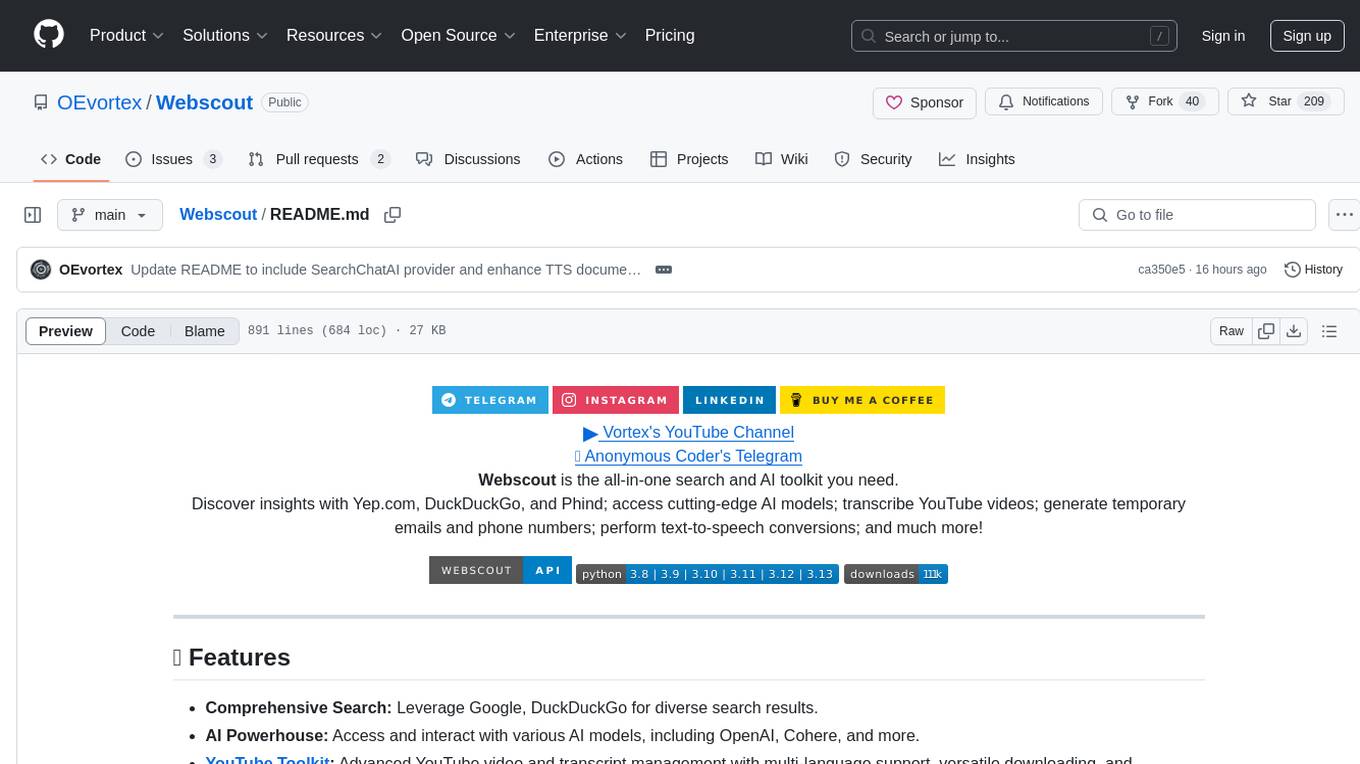
Webscout
Webscout is an all-in-one Python toolkit for web search, AI interaction, digital utilities, and more. It provides access to diverse search engines, cutting-edge AI models, temporary communication tools, media utilities, developer helpers, and powerful CLI interfaces through a unified library. With features like comprehensive search leveraging Google and DuckDuckGo, AI powerhouse for accessing various AI models, YouTube toolkit for video and transcript management, GitAPI for GitHub data extraction, Tempmail & Temp Number for privacy, Text-to-Speech conversion, GGUF conversion & quantization, SwiftCLI for CLI interfaces, LitPrinter for styled console output, LitLogger for logging, LitAgent for user agent generation, Text-to-Image generation, Scout for web parsing and crawling, Awesome Prompts for specialized tasks, Weather Toolkit, and AI Search Providers.
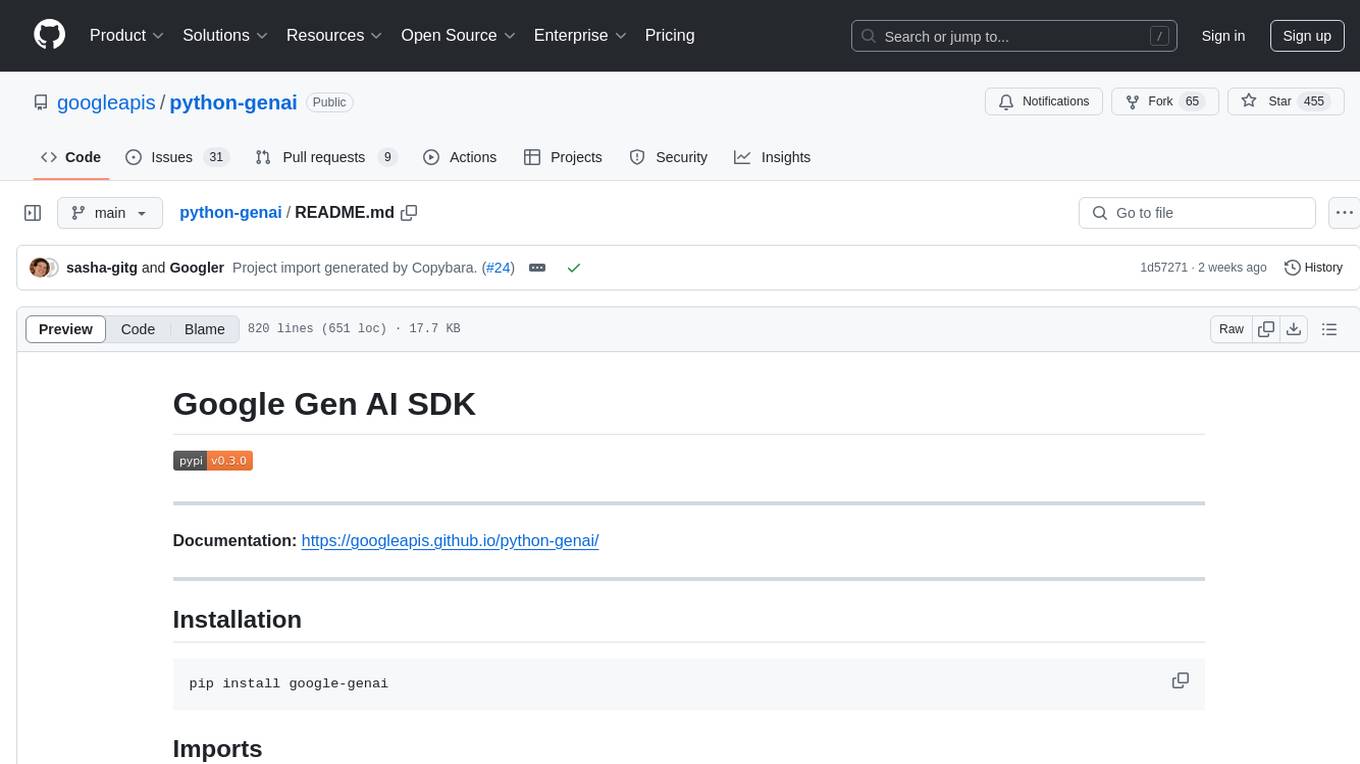
python-genai
The Google Gen AI SDK is a Python library that provides access to Google AI and Vertex AI services. It allows users to create clients for different services, work with parameter types, models, generate content, call functions, handle JSON response schemas, stream text and image content, perform async operations, count and compute tokens, embed content, generate and upscale images, edit images, work with files, create and get cached content, tune models, distill models, perform batch predictions, and more. The SDK supports various features like automatic function support, manual function declaration, JSON response schema support, streaming for text and image content, async methods, tuning job APIs, distillation, batch prediction, and more.
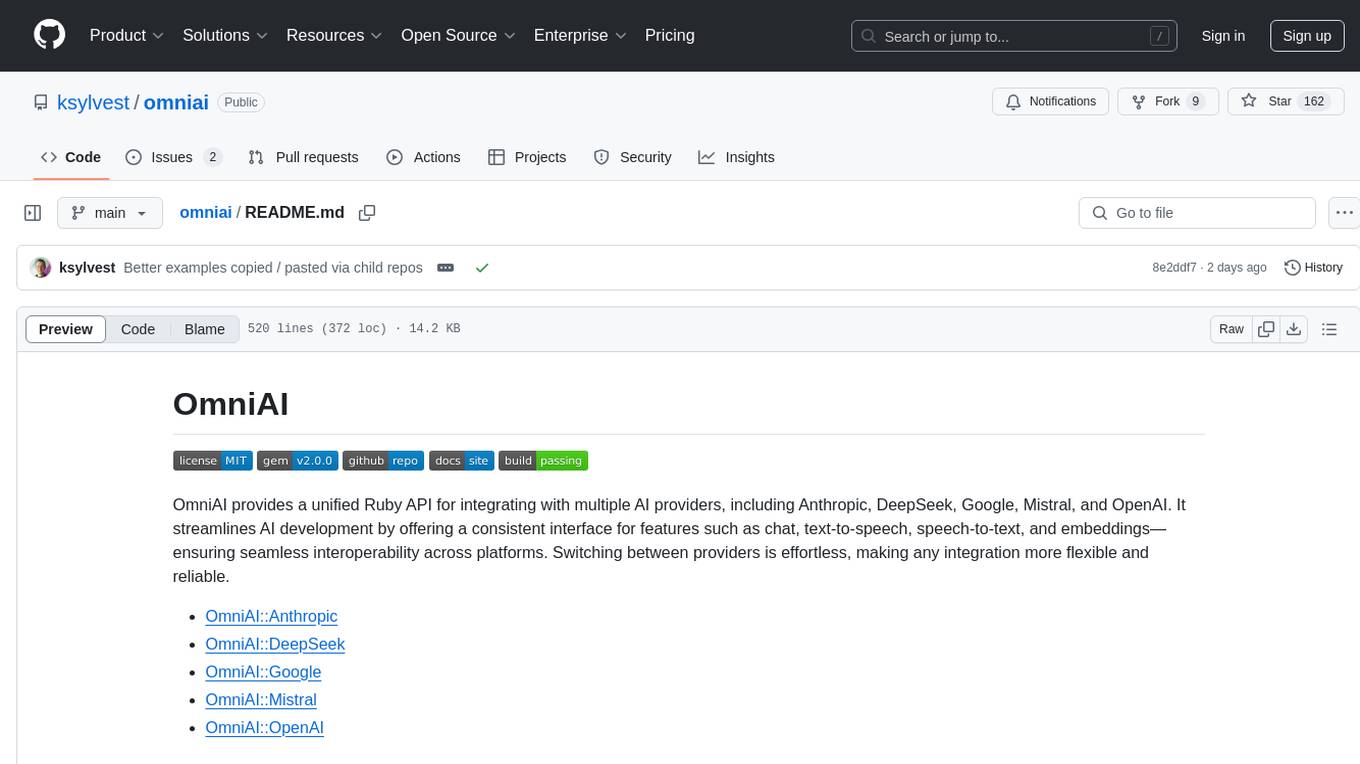
omniai
OmniAI provides a unified Ruby API for integrating with multiple AI providers, streamlining AI development by offering a consistent interface for features such as chat, text-to-speech, speech-to-text, and embeddings. It ensures seamless interoperability across platforms and effortless switching between providers, making integrations more flexible and reliable.

instructor
Instructor is a popular Python library for managing structured outputs from large language models (LLMs). It offers a user-friendly API for validation, retries, and streaming responses. With support for various LLM providers and multiple languages, Instructor simplifies working with LLM outputs. The library includes features like response models, retry management, validation, streaming support, and flexible backends. It also provides hooks for logging and monitoring LLM interactions, and supports integration with Anthropic, Cohere, Gemini, Litellm, and Google AI models. Instructor facilitates tasks such as extracting user data from natural language, creating fine-tuned models, managing uploaded files, and monitoring usage of OpenAI models.
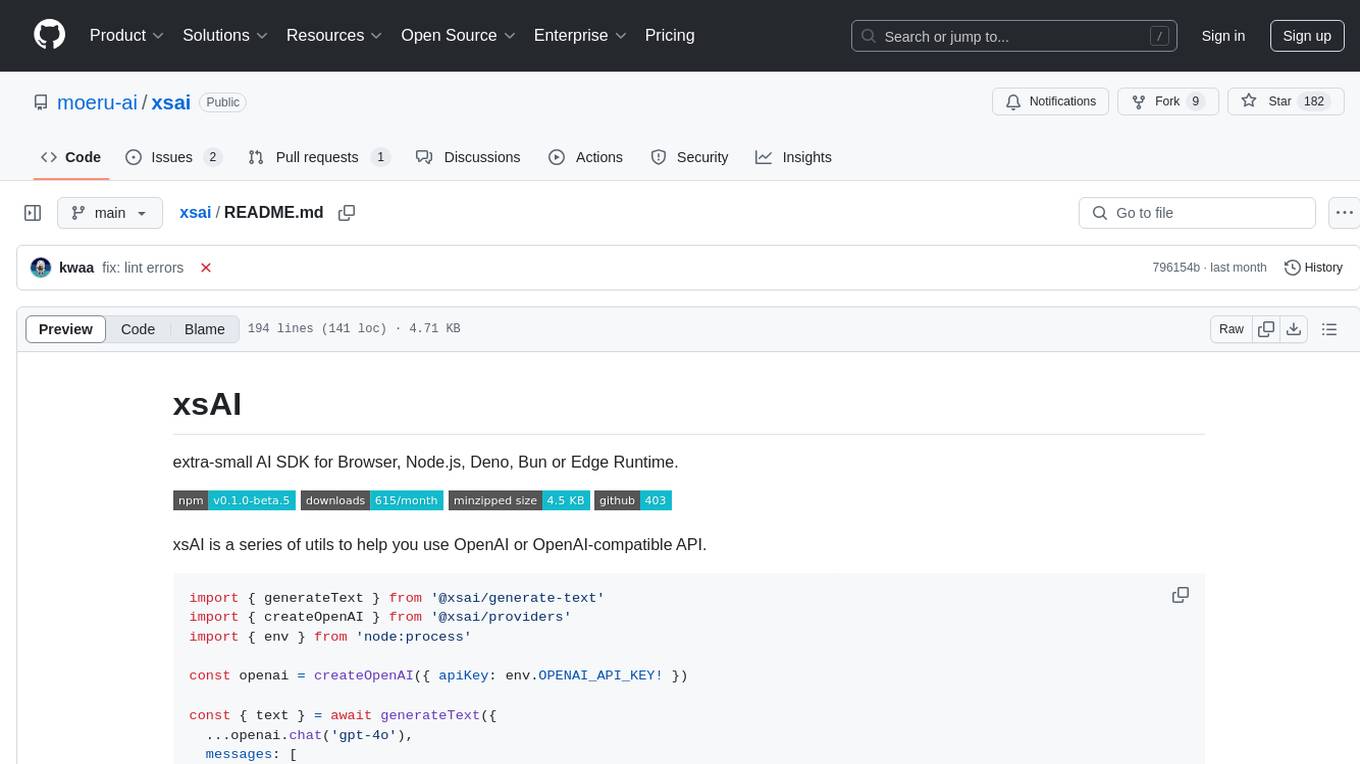
xsai
xsAI is an extra-small AI SDK designed for Browser, Node.js, Deno, Bun, or Edge Runtime. It provides a series of utils to help users utilize OpenAI or OpenAI-compatible APIs. The SDK is lightweight and efficient, using a variety of methods to minimize its size. It is runtime-agnostic, working seamlessly across different environments without depending on Node.js Built-in Modules. Users can easily install specific utils like generateText or streamText, and leverage tools like weather to perform tasks such as getting the weather in a location.
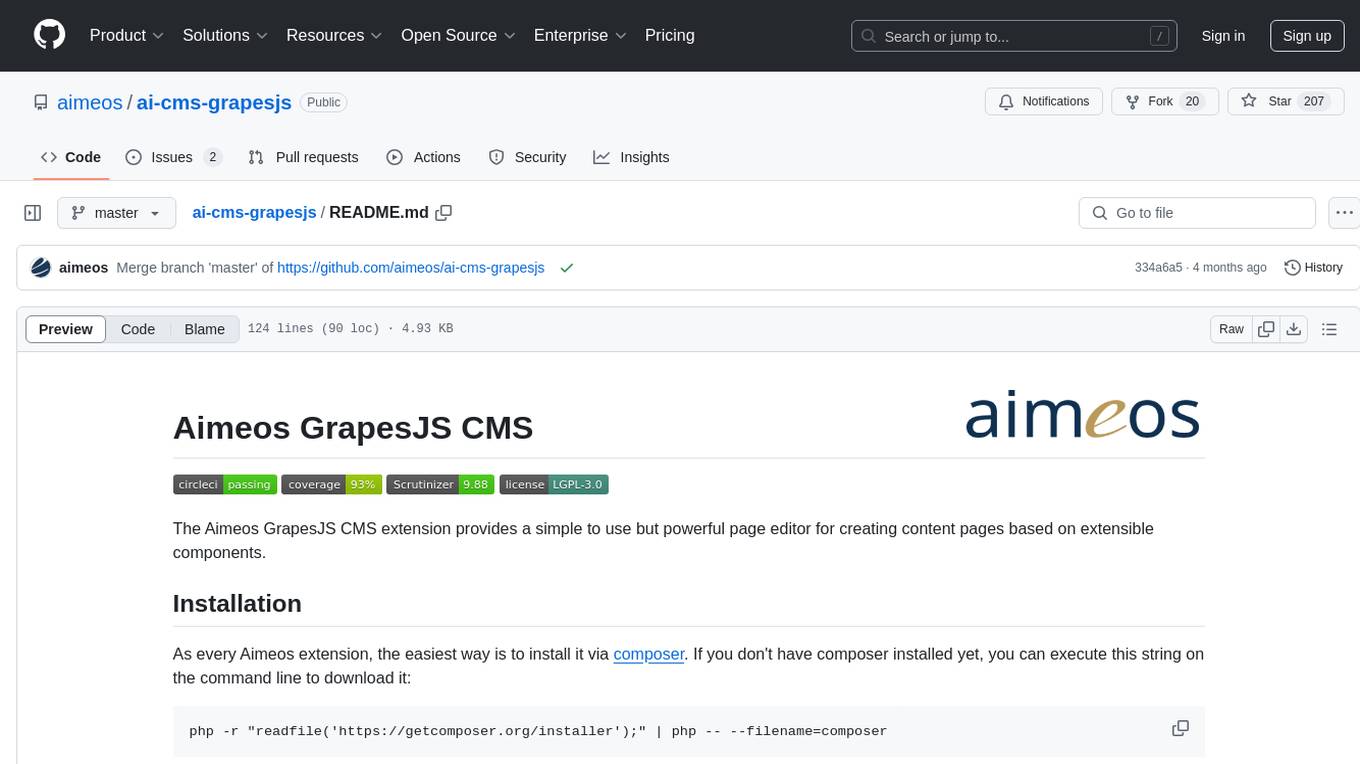
ai-cms-grapesjs
The Aimeos GrapesJS CMS extension provides a simple to use but powerful page editor for creating content pages based on extensible components. It integrates seamlessly with Laravel applications and allows users to easily manage and display CMS content. The tool also supports Google reCAPTCHA v3 for enhanced security. Users can create and customize pages with various components and manage multi-language setups effortlessly. The extension simplifies the process of creating and managing content pages, making it ideal for developers and businesses looking to enhance their website's content management capabilities.
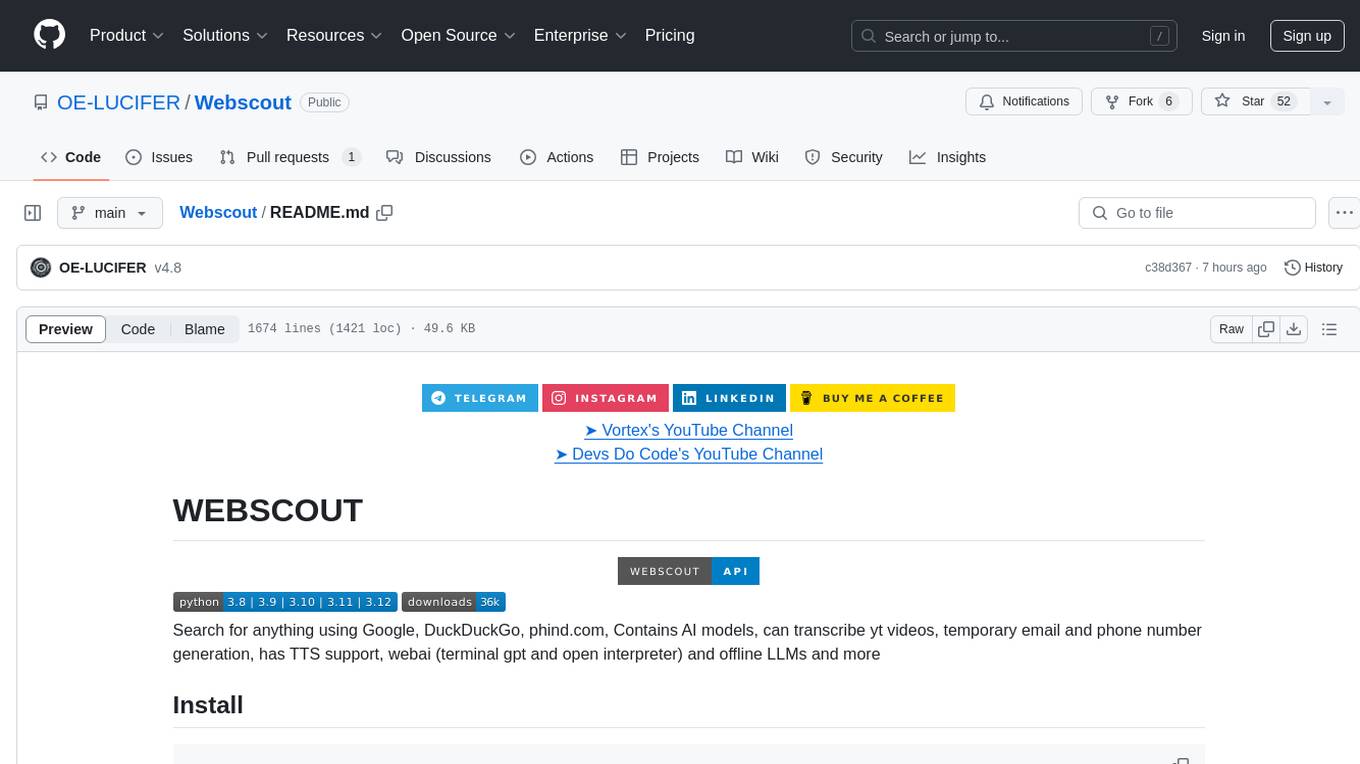
Webscout
WebScout is a versatile tool that allows users to search for anything using Google, DuckDuckGo, and phind.com. It contains AI models, can transcribe YouTube videos, generate temporary email and phone numbers, has TTS support, webai (terminal GPT and open interpreter), and offline LLMs. It also supports features like weather forecasting, YT video downloading, temp mail and number generation, text-to-speech, advanced web searches, and more.

lagent
Lagent is a lightweight open-source framework that allows users to efficiently build large language model(LLM)-based agents. It also provides some typical tools to augment LLM. The overview of our framework is shown below:
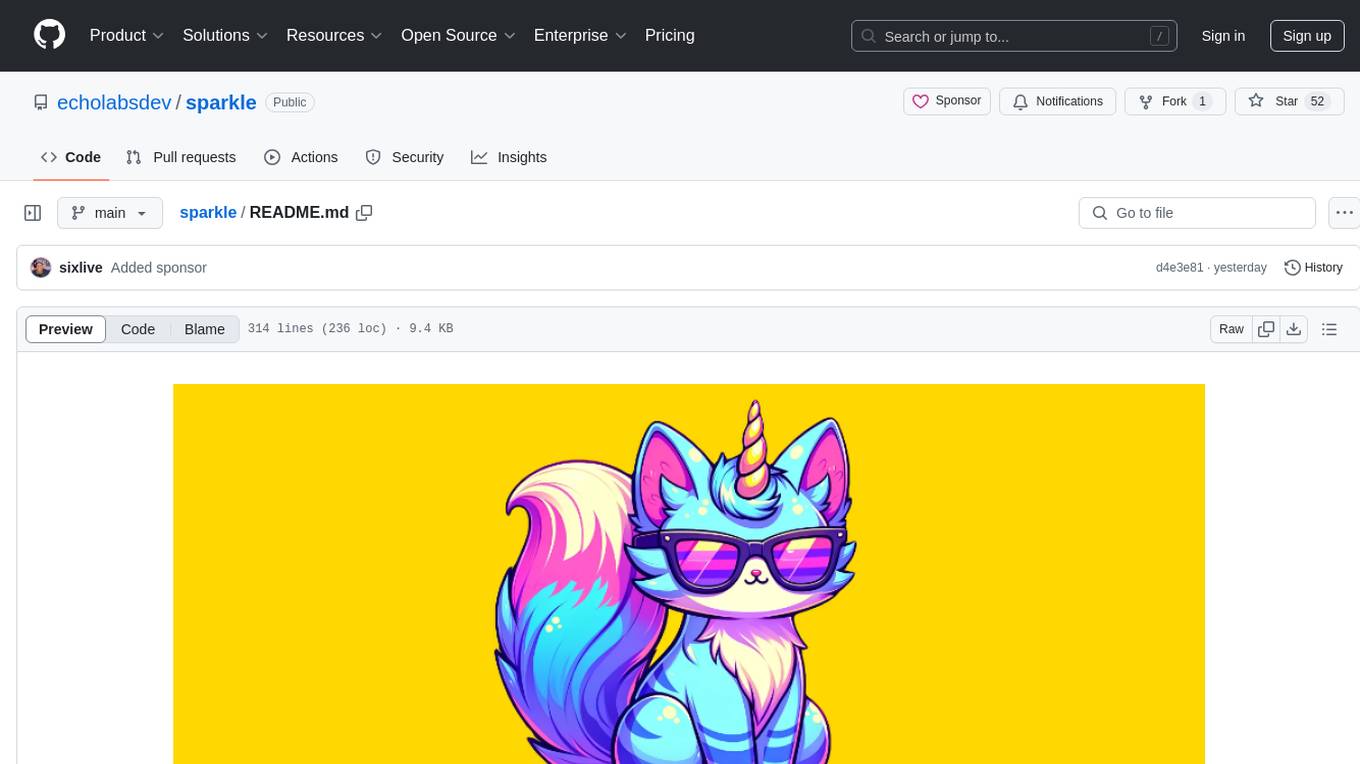
sparkle
Sparkle is a tool that streamlines the process of building AI-driven features in applications using Large Language Models (LLMs). It guides users through creating and managing agents, defining tools, and interacting with LLM providers like OpenAI. Sparkle allows customization of LLM provider settings, model configurations, and provides a seamless integration with Sparkle Server for exposing agents via an OpenAI-compatible chat API endpoint.
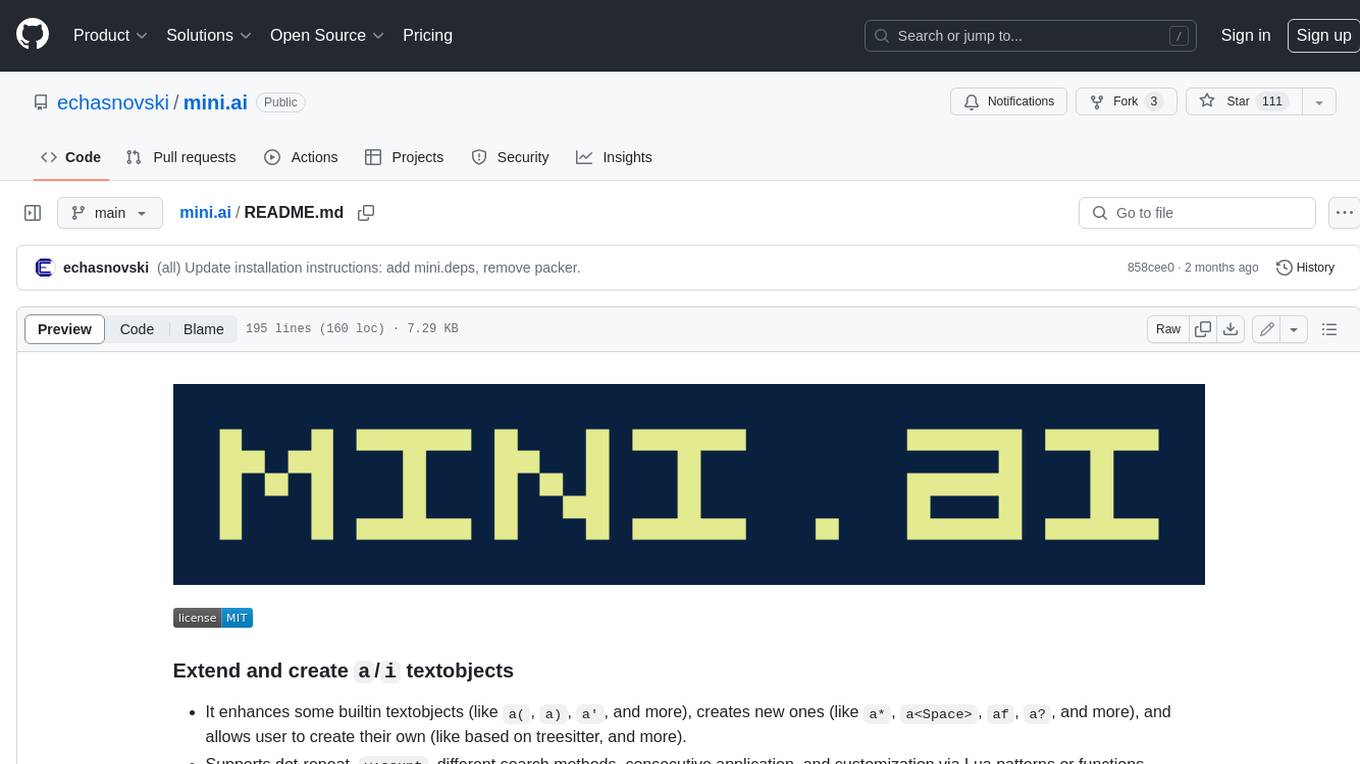
mini.ai
This plugin extends and creates `a`/`i` textobjects in Neovim. It enhances some builtin textobjects (like `a(`, `a)`, `a'`, and more), creates new ones (like `a*`, `a
For similar tasks

nlp-llms-resources
The 'nlp-llms-resources' repository is a comprehensive resource list for Natural Language Processing (NLP) and Large Language Models (LLMs). It covers a wide range of topics including traditional NLP datasets, data acquisition, libraries for NLP, neural networks, sentiment analysis, optical character recognition, information extraction, semantics, topic modeling, multilingual NLP, domain-specific LLMs, vector databases, ethics, costing, books, courses, surveys, aggregators, newsletters, papers, conferences, and societies. The repository provides valuable information and resources for individuals interested in NLP and LLMs.
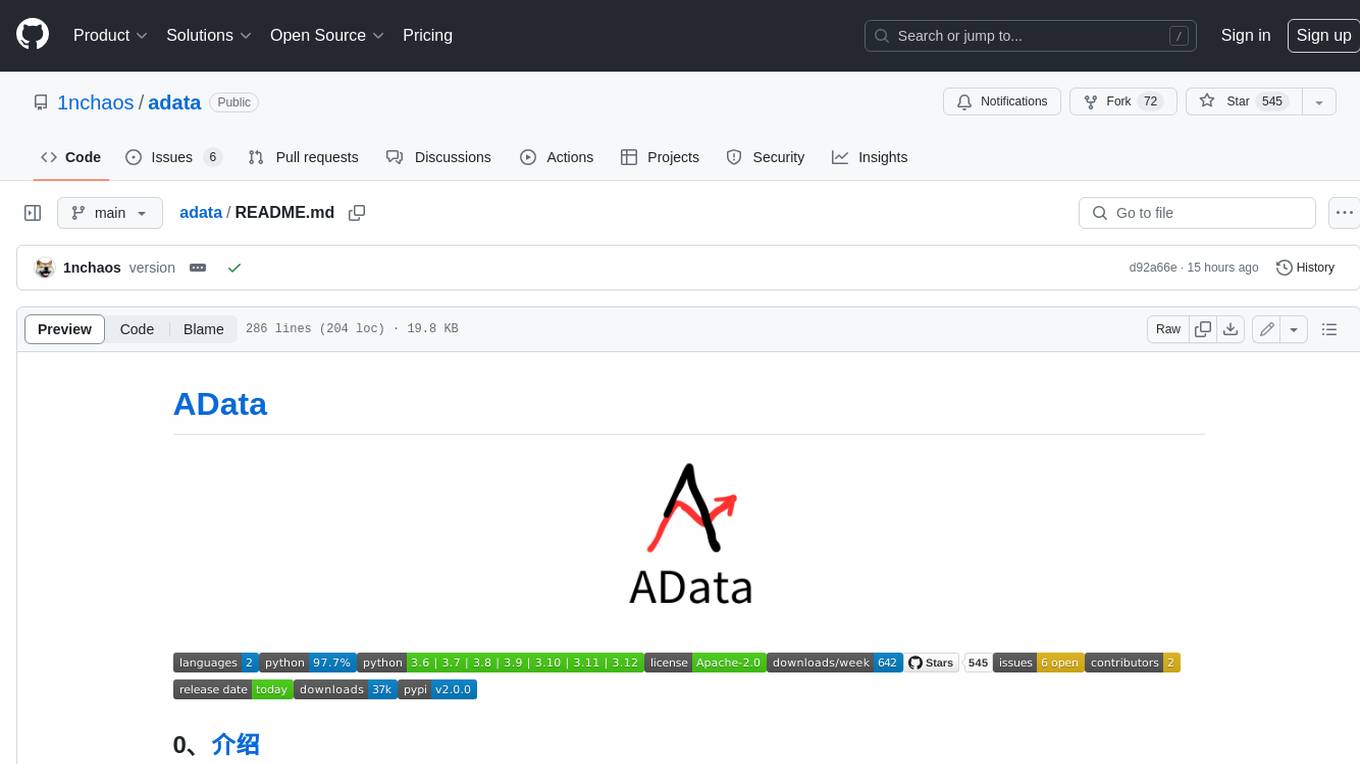
adata
AData is a free and open-source A-share database that focuses on transaction-related data. It provides comprehensive data on stocks, including basic information, market data, and sentiment analysis. AData is designed to be easy to use and integrate with other applications, making it a valuable tool for quantitative trading and AI training.

PIXIU
PIXIU is a project designed to support the development, fine-tuning, and evaluation of Large Language Models (LLMs) in the financial domain. It includes components like FinBen, a Financial Language Understanding and Prediction Evaluation Benchmark, FIT, a Financial Instruction Dataset, and FinMA, a Financial Large Language Model. The project provides open resources, multi-task and multi-modal financial data, and diverse financial tasks for training and evaluation. It aims to encourage open research and transparency in the financial NLP field.

hezar
Hezar is an all-in-one AI library designed specifically for the Persian community. It brings together various AI models and tools, making it easy to use AI with just a few lines of code. The library seamlessly integrates with Hugging Face Hub, offering a developer-friendly interface and task-based model interface. In addition to models, Hezar provides tools like word embeddings, tokenizers, feature extractors, and more. It also includes supplementary ML tools for deployment, benchmarking, and optimization.
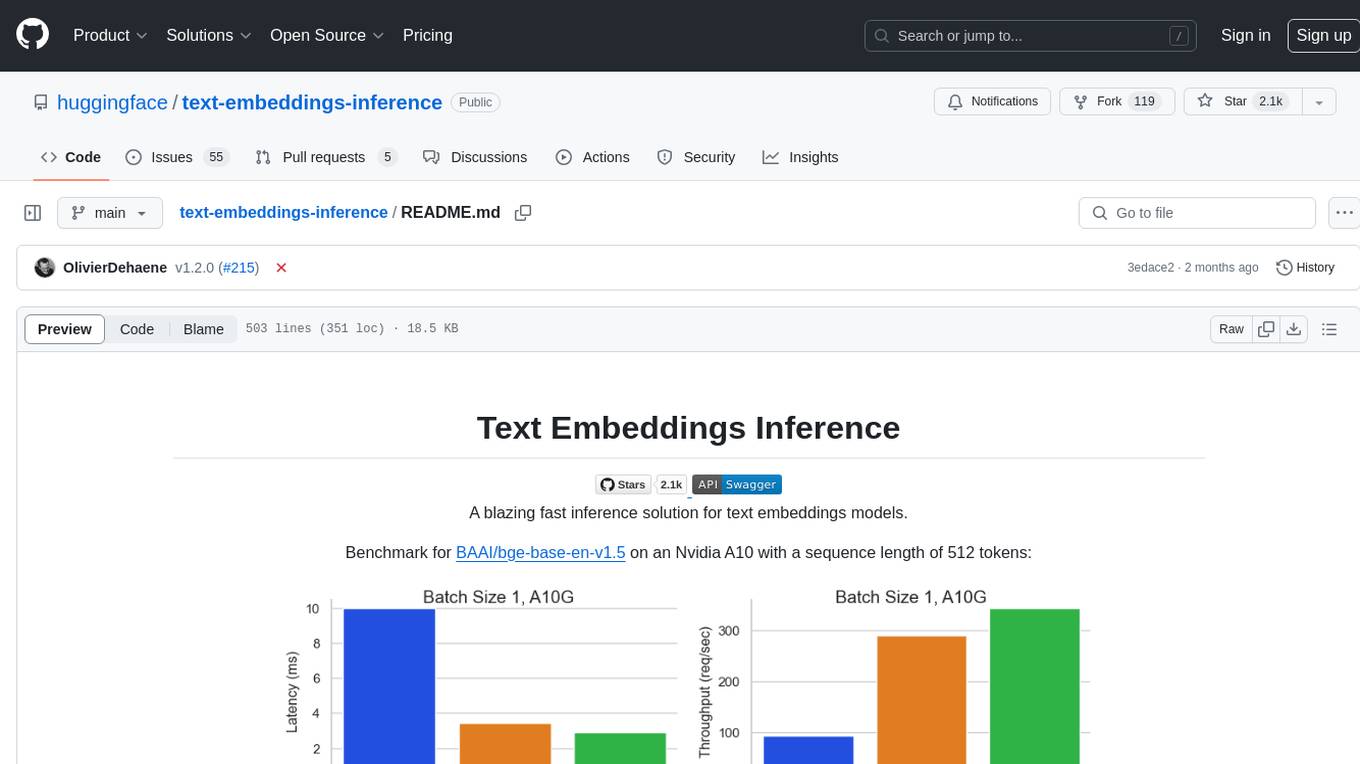
text-embeddings-inference
Text Embeddings Inference (TEI) is a toolkit for deploying and serving open source text embeddings and sequence classification models. TEI enables high-performance extraction for popular models like FlagEmbedding, Ember, GTE, and E5. It implements features such as no model graph compilation step, Metal support for local execution on Macs, small docker images with fast boot times, token-based dynamic batching, optimized transformers code for inference using Flash Attention, Candle, and cuBLASLt, Safetensors weight loading, and production-ready features like distributed tracing with Open Telemetry and Prometheus metrics.

CodeProject.AI-Server
CodeProject.AI Server is a standalone, self-hosted, fast, free, and open-source Artificial Intelligence microserver designed for any platform and language. It can be installed locally without the need for off-device or out-of-network data transfer, providing an easy-to-use solution for developers interested in AI programming. The server includes a HTTP REST API server, backend analysis services, and the source code, enabling users to perform various AI tasks locally without relying on external services or cloud computing. Current capabilities include object detection, face detection, scene recognition, sentiment analysis, and more, with ongoing feature expansions planned. The project aims to promote AI development, simplify AI implementation, focus on core use-cases, and leverage the expertise of the developer community.
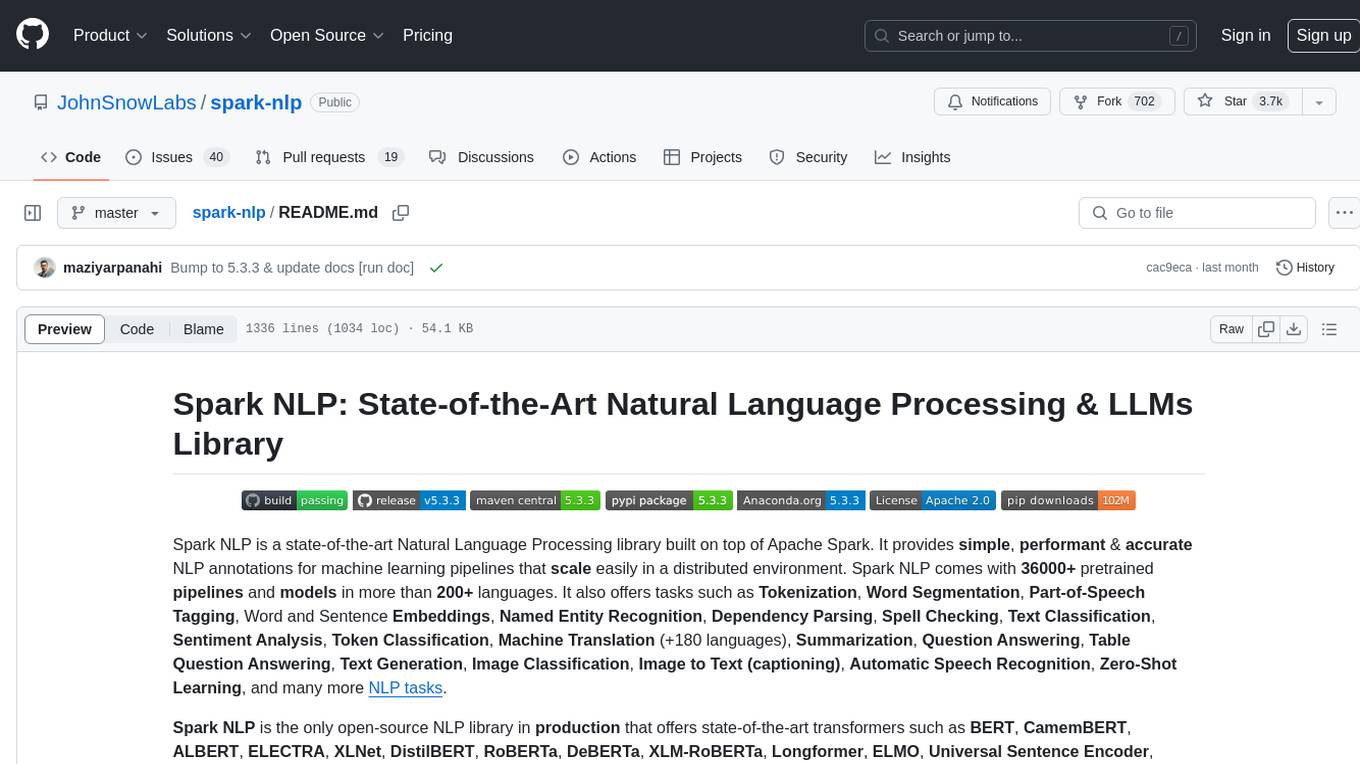
spark-nlp
Spark NLP is a state-of-the-art Natural Language Processing library built on top of Apache Spark. It provides simple, performant, and accurate NLP annotations for machine learning pipelines that scale easily in a distributed environment. Spark NLP comes with 36000+ pretrained pipelines and models in more than 200+ languages. It offers tasks such as Tokenization, Word Segmentation, Part-of-Speech Tagging, Named Entity Recognition, Dependency Parsing, Spell Checking, Text Classification, Sentiment Analysis, Token Classification, Machine Translation, Summarization, Question Answering, Table Question Answering, Text Generation, Image Classification, Image to Text (captioning), Automatic Speech Recognition, Zero-Shot Learning, and many more NLP tasks. Spark NLP is the only open-source NLP library in production that offers state-of-the-art transformers such as BERT, CamemBERT, ALBERT, ELECTRA, XLNet, DistilBERT, RoBERTa, DeBERTa, XLM-RoBERTa, Longformer, ELMO, Universal Sentence Encoder, Llama-2, M2M100, BART, Instructor, E5, Google T5, MarianMT, OpenAI GPT2, Vision Transformers (ViT), OpenAI Whisper, and many more not only to Python and R, but also to JVM ecosystem (Java, Scala, and Kotlin) at scale by extending Apache Spark natively.
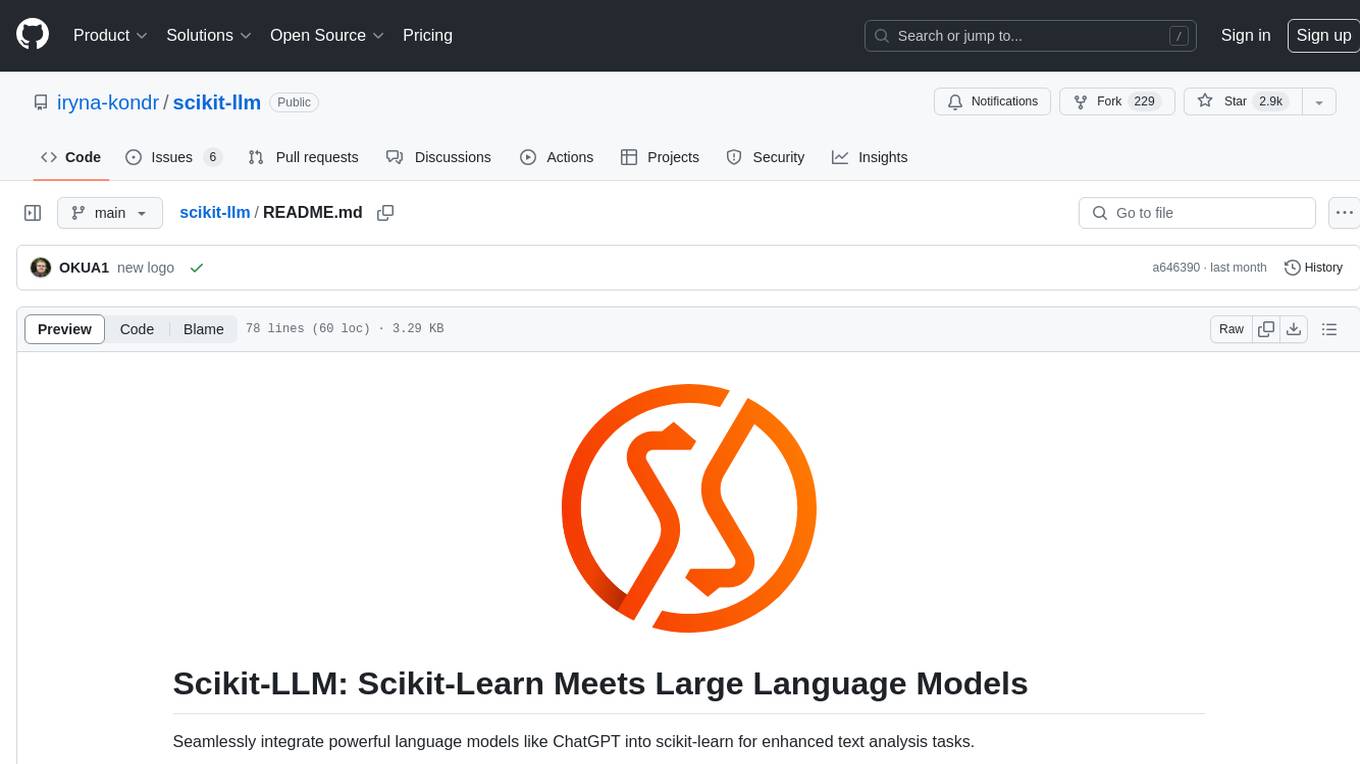
scikit-llm
Scikit-LLM is a tool that seamlessly integrates powerful language models like ChatGPT into scikit-learn for enhanced text analysis tasks. It allows users to leverage large language models for various text analysis applications within the familiar scikit-learn framework. The tool simplifies the process of incorporating advanced language processing capabilities into machine learning pipelines, enabling users to benefit from the latest advancements in natural language processing.
For similar jobs

sweep
Sweep is an AI junior developer that turns bugs and feature requests into code changes. It automatically handles developer experience improvements like adding type hints and improving test coverage.

teams-ai
The Teams AI Library is a software development kit (SDK) that helps developers create bots that can interact with Teams and Microsoft 365 applications. It is built on top of the Bot Framework SDK and simplifies the process of developing bots that interact with Teams' artificial intelligence capabilities. The SDK is available for JavaScript/TypeScript, .NET, and Python.

ai-guide
This guide is dedicated to Large Language Models (LLMs) that you can run on your home computer. It assumes your PC is a lower-end, non-gaming setup.

classifai
Supercharge WordPress Content Workflows and Engagement with Artificial Intelligence. Tap into leading cloud-based services like OpenAI, Microsoft Azure AI, Google Gemini and IBM Watson to augment your WordPress-powered websites. Publish content faster while improving SEO performance and increasing audience engagement. ClassifAI integrates Artificial Intelligence and Machine Learning technologies to lighten your workload and eliminate tedious tasks, giving you more time to create original content that matters.

chatbot-ui
Chatbot UI is an open-source AI chat app that allows users to create and deploy their own AI chatbots. It is easy to use and can be customized to fit any need. Chatbot UI is perfect for businesses, developers, and anyone who wants to create a chatbot.

BricksLLM
BricksLLM is a cloud native AI gateway written in Go. Currently, it provides native support for OpenAI, Anthropic, Azure OpenAI and vLLM. BricksLLM aims to provide enterprise level infrastructure that can power any LLM production use cases. Here are some use cases for BricksLLM: * Set LLM usage limits for users on different pricing tiers * Track LLM usage on a per user and per organization basis * Block or redact requests containing PIIs * Improve LLM reliability with failovers, retries and caching * Distribute API keys with rate limits and cost limits for internal development/production use cases * Distribute API keys with rate limits and cost limits for students

uAgents
uAgents is a Python library developed by Fetch.ai that allows for the creation of autonomous AI agents. These agents can perform various tasks on a schedule or take action on various events. uAgents are easy to create and manage, and they are connected to a fast-growing network of other uAgents. They are also secure, with cryptographically secured messages and wallets.

griptape
Griptape is a modular Python framework for building AI-powered applications that securely connect to your enterprise data and APIs. It offers developers the ability to maintain control and flexibility at every step. Griptape's core components include Structures (Agents, Pipelines, and Workflows), Tasks, Tools, Memory (Conversation Memory, Task Memory, and Meta Memory), Drivers (Prompt and Embedding Drivers, Vector Store Drivers, Image Generation Drivers, Image Query Drivers, SQL Drivers, Web Scraper Drivers, and Conversation Memory Drivers), Engines (Query Engines, Extraction Engines, Summary Engines, Image Generation Engines, and Image Query Engines), and additional components (Rulesets, Loaders, Artifacts, Chunkers, and Tokenizers). Griptape enables developers to create AI-powered applications with ease and efficiency.













